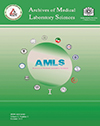Investigation of the association of CCL22 gene polymorphism rs4359426 with multiple sclerosis
Archives of Medical Laboratory Sciences,
Vol. 1 No. 2 (2015),
12 October 2015
https://doi.org/10.22037/amls.v1i2.9179
Abstract
Background: CCL22 is a chemokine that induces the migration of Th2- and regulatory T cells to the inflammatory sites. The aim of this study was to investigate the association of a single nucleotide polymorphism (SNP), rs4359426, in CCL22 gene, with multiple sclerosis (MS) in patients from southeast of Iran.
Materials and Methods: The blood samples collected from 150 patients with MS and 150 healthy subjects as a control group. The serum levels of CCL22 measured by ELISA and the DNA analyzed for CCL22 polymorphism using PCR-RFLP method.
Results: There were no significant differences in the frequencies of genotypes and alleles at SNP rs4359426 in CCL22 gene between MS patients and controls. No significant differences also observed between controls and patients with RRMS, SPMS, PPMS and PRMS patterns regarding the genetic variation at rs4359426. In both MS and control groups, No significant differences were observed between subjects with CC, CA and AA genotypes or between subjects with C and A alleles at rs4359426 with respect to the serum levels of CCL22.
Conclusion: These results do not show any association between the investigated genotypes and alleles at at rs4359426 in CCL22 gene with MS or its patterns in MS patients. The serum levels of chemokine did not also influence by genetic variation at SNP rs4359426.
- Multiple sclerosis
- CCL22
- Chemokine
- Polymorphism
How to Cite
References
Munoz-Culla M, Irizar H, Otaegui D. The genetics of multiple sclerosis: review of current and emerging candidates. Appl Clin Genet. 2013;6:63-73.
Anlar O. Treatment of multiple sclerosis. CNS Neurol Disord Drug Targets. 2009;8:167-74.
Rodgers JM, Miller SD: Cytokine control of inflammation and repair in the pathology of multiple sclerosis. Yale J Biol Med. 2012;85:447-68.
Buc M. Role of regulatory T cells in pathogenesis and biological therapy of multiple sclerosis. Mediators Inflamm. 2013; 963748.
Hirahara K, Poholek A, Vahedi G, Laurence A, Kanno Y, Milner JD, O'Shea JJ. Mechanisms underlying helper T-cell plasticity: implications for immune-mediated disease. J Allergy Clin Immunol. 2013;131:1276-87.
Yamane H, Paul WE. Early signaling events that underlie fate decisions of naive CD4(+) T cells toward distinct T-helper cell subsets. Immunol Rev. 2013;252:12-23.
Awad AM, Stuve O. Immunopathogenesis of multiple sclerosis:
new insights and therapeutic implications. Continuum (Minneap Minn). 2010;16:166-80.
Tumani H, Kassubek J, Hijazi M, Lehmensiek V, Unrath A, Sussmuth S, Lauda F, Kapfer T, Fang L, Senel M, Brettschneider J. Patterns of TH1/TH2 cytokines predict clinical response in multiple sclerosis patients treated with glatiramer acetate. Eur Neurol. 2011;65:164-9.
Holman DW, Klein RS, Ransohoff RM. The blood-brain barrier, chemokines and multiple sclerosis. Biochim Biophys Acta. 2011;1812:220-30.
Raman D, Sobolik-Delmaire T, Richmond A. Chemokines in health and disease. Exp Cell Res. 2011;317:575-89.
Banfield G, Watanabe H, Scadding G, Jacobson MR, Till SJ, Hall DA, Robinson DS, Lloyd CM, Nouri-Aria KT, Durham SR. CC chemokine receptor 4 (CCR4) in human allergen-induced late nasal responses. Allergy. 2010;65:1126-33.
Nakayama T, Hieshima K, Nagakubo D, Sato E, Nakayama M, Kawa K, Yoshie O. Selective induction of Th2-attracting chemokines CCL17 and CCL22 in human B cells by latent membrane protein 1 of Epstein-Barr virus. J Virol. 2004;78:1665-74.
Greaves DR, Hakkinen T, Lucas AD, Liddiard K, Jones E, Quinn CM, Senaratne J, Green FR, Tyson K, Boyle J, Shanahan C, Weissberg PL, Gordon S, Yla-Hertualla S. Linked chromosome 16q13 chemokines, macrophage-derived chemokine, fractalkine, and thymus- and activation-regulated chemokine, are expressed in human atherosclerotic lesions. Arterioscler Thromb Vasc Biol. 2001;21:923-9.
Wang G, Yu D, Tan W, Zhao D, Wu C, Lin D. Genetic polymorphism in chemokine CCL22 and susceptibility to Helicobacter pylori infection-related gastric carcinoma. Cancer. 2009;115:2430-2437.
McDonald WI, Compston A, Edan G, Goodkin D, Hartung HP, Lublin FD, McFarland HF, Paty DW, Polman CH, Reingold SC, Sandberg-Wollheim M, Sibley W, Thompson A, van den Noort S, Weinshenker BY, Wolinsky JS. Recommended diagnostic criteria for multiple sclerosis: guidelines from the International Panel on the diagnosis of multiple sclerosis. Ann Neurol. 2001;50:121-7.
Miller SA, Dykes DD, Polesky HF. A simple salting out procedure for extracting DNA from human nucleated cells. Nucleic Acids Res. 1988;16:1215.
Galimberti D, Scalabrini D, Fenoglio C, De Riz M, Comi C, Venturelli E, Cortini F, Piola M, Leone M, Dianzani U, D'Alfonso S, Monaco F, Bresolin N, Scarpini E. Gender-specific influence of the chromosome 16 chemokine gene cluster on the susceptibility to Multiple Sclerosis. J Neurol Sci. 2008;267:86-90.
Erfani N, Moghaddasi-Sani F, Razmkhah M, Haghshenas MR, Talei A, Ghaderi A. CCL22 16C/A Genetic Variation is not Associated with Breast Carcinoma in Southern Iranian Population. Iran J Immunol. 2012;9:226-33.
Erfani N. CCR4 C1014T and CCL22 C16A genetic variations in the Iranian patients with colorectal adenocarcinoma. Iran J Allergy Asthma Immunol. 2014; 13: 440-6.
Janssen R, Bont L, Siezen CL, Hodemaekers HM, Ermers MJ, Doornbos G, van 't Slot R, Wijmenga C, Goeman JJ, Kimpen JL, van Houwelingen HC, Kimman TG, Hoebee B. Genetic susceptibility to respiratory syncytial virus bronchiolitis is predominantly associated with innate immune genes. J Infect Dis.
;196:826-34.
Fisher SA, Moody A, Mirza MM, Cuthbert AP, Hampe J, Macpherson A, Sanderson J, Forbes A, Mansfield J, Schreiber S, Lewis CM, Mathew CG. Genetic variation at the chromosome 16
chemokine gene cluster: development of a strategy for association studies in complex disease. Ann Hum Genet. 2003;67:377-90.
Spek EJ, Olson CA, Shi Z, NR. K. Alanine is an intrinsic α-helix stabilizing amino acid. J Am Chem Soc. 1999;67:377-90.
- Abstract Viewed: 88 times
- PDF Downloaded: 43 times
